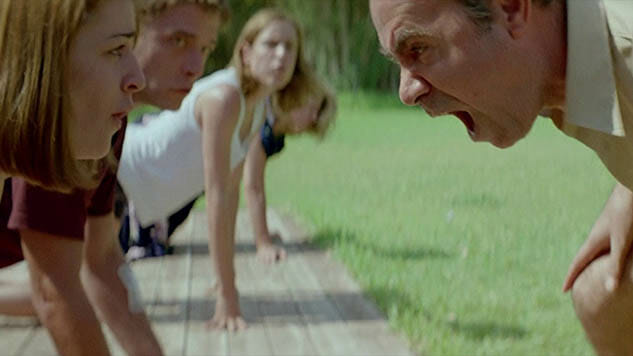Let’s Talk about Love: The Films of Yorgos Lanthimos

“To try to write love is to confront the muck of language; that region of hysteria where language is both too much and too little, excessive (by the limitless expansion of the ego, by emotive submersion) and impoverished (by the codes on which love diminishes and levels it).” — Roland Barthes, A Lover’s Discourse: Fragments
What of Yorgos Lanthimos’s heart? It is swollen, grotesque, filling up with blood like the wounds of Queen Anne in The Favourite. It is wrapped with barbed wire, punctured as if by a dart like those of the hunters in The Lobster. It is alive again, as if from the dead, but a facsimile, a performance, like what the actor does in Alps. It is known by another word, like “cat” or “wolf” or “party,” as in Dogtooth. It is exposed, objectified, scrutinized, nearly pressed up against the lens, like in The Killing of a Sacred Deer.
Much has been made of the Greek director’s taste for debasement, his cruel thought experiments, his manipulative scenarios, his little terrarium with ants he will gleefully subject to the burn of a magnifying glass as they scurry against a system built against them. One might suggest he has no heart, that his idiosyncratic sadism is only that: a sort of sadism. Whether he’s throwing Colin Farrell and Ben Whishaw into a society that turns compulsory monogamy into a mandatory life, or recreating bereavement to snip off reconciliation of grief, or disrupting a nice doctor’s family, or deconstructing family and society with language, or letting Rachel Weisz and Emma Stone duke it out for power—one thing is clear, and quite the contrary to much of the criticism against him: His heart is there, in every frame, ready to be maimed for your (dis)pleasure.
Isn’t it there from the beginning of The Lobster anyways? Weisz’s flat affect in narration makes Colin Farrell’s lead, David, seem more pitiable. His response to the hotel manager’s (Olivia Colman) question of what animal he would like to be is wrought with sadness, a kind of pathetic, wallowy tone that anyone who has had their heart broken can recognize. “Because lobsters live for over one hundred years…” David slouches on the edge of the bed, too depressed for good posture, and his deadpan delivery nonetheless betrays ache. He sounds like he would like to die. If Lanthimos’s trademark, his culled-together words as line readings devoid of emotion, suggests that his characters are, on the contrary, filled with emotion, that conventional expressions of sadness, anger, depression, fear, ambition, loss, grief, confusion, fury and love are inadequate. David almost sounds like defeat.
-

-

-

-

-

-

-

-

-

-

-

-

-

-

-

-

-

-

-

-

-

-

-

-

-

-

-

-

-

-

-

-

-

-

-

-

-

-

-

-








































